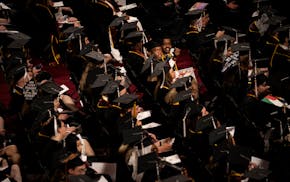In today's intricately connected global economy, it's not a stretch to say the whole world was watching Monday as the U.S. banking system's $700 billion bailout package went before the U.S. House of Representatives. At stake: not only the health of the U.S. economy, but also the stability of much of the industrialized world.
A Star Tribune editorial writer was halfway across the world in Turkey when some of the goriest details of America's financial meltdown became public. Journalists traveling as part of an international reporting project often needed an interpreter as they talked economics last week with the titans of Turkish business.
But certain phrases needed no help leaping the language divide: Black Monday, Wall Street, subprime, bailout. All were followed by genuine looks of concern. "We are following [this] closely,'' said one corporate giant who'd made a fortune in pharmaceuticals, speaking through an interpreter. "There are ill winds blowing from the U.S. We do not know how it will affect us here.''
The bailout measure fell short by 23 votes in the House of Representatives, sending stocks off a cliff. It came after a weekend of fevered negotiations in which it appeared common sense had made a welcome and unusual appearance in Washington. Key lawmakers were meeting. They ironed out differences. The bailout wasn't perfect, but it was a thoughtful, rational response to a crisis in which there are no easy solutions nor obvious answers. It was time for action and putting politics aside.
It was too good to last. Around lunchtime, politics reared its ugly head. Despite urgings from President Bush and leadership from both parties, 228 politicians voted down the measure — 95 Democrats and 133 Republicans. Among the Minnesota delegation voting no: Minnesota Republicans Michele Bachmann and Jim Ramstad, and Democrats Collin Peterson and Tim Walz.
Prior to the vote, grass-roots groups urged voters to swamp lawmakers with letters and e-mails opposing the bailout just five weeks before the election. The outrage was understandable, but it was limited in scope. Lawmakers should have listened but risen above it for the greater good of the nation and, quite possibly, the world. "Nobody likes the idea of helping out a bunch of people who have gotten very rich through financial engineering. But I think people just don't understand well enough the damage that will be felt by not passing this bill. It's not just the 'Masters of the Universe' on Wall Street but regular people who will feel pain,'' said the Brookings Institution's Douglas Elmendorf.
The bailout did not come with a guarantee that it would work. In fact, many economists said cleaning up the bad debt held by Wall Street firms and banks would be just the first step needed to stabilize the U.S. economy. Instead of taking that step, the House rejected the dire warnings of the president and the heads of the Treasury, Federal Reserve and the Securities and Exchange Commission.
Treasury Secretary Henry Paulson brought a bare-bones bailout plan to Capitol Hill knowing that Democrats and Republicans would try to load it down with any number of provisions — some worthwhile and many ill-conceived. Paulson worked with the administration and members of both parties to draft a package that provided the greatest possible upside for taxpayers without rewarding bailed out executives. In all of those negotiations, Paulson kept the focus on the main goal of the bill — stabilizing the markets and the U.S. economy.
Lawmakers who recklessly voted down the measure lost sight of that goal and did a disservice to their constituents and country. There is talk that the measure could come back before the House a second time. Let's hope that there is indeed a second chance in politics and that this time, cooler heads prevail.

Readers Write: State flag, college sports, theft prevention
It's not funny: The disheartening state of creative and cultural nonprofits in Minnesota

Universities mirror society and the lack of trust in institutions



